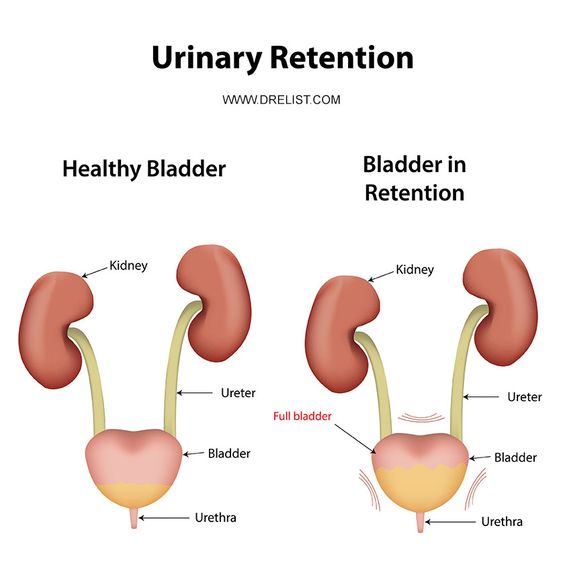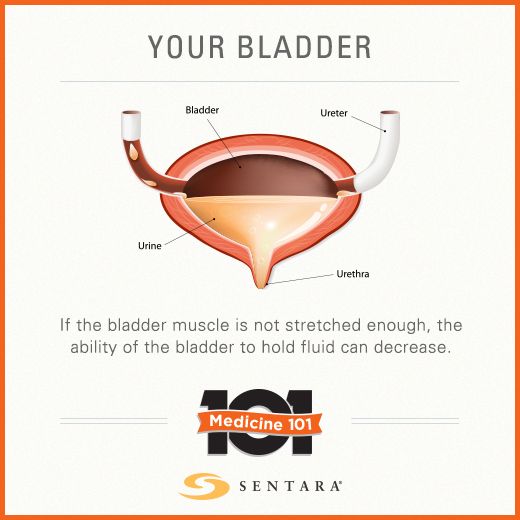Signs And Symptoms Of Urinary Retention
Depending on the severity and duration of the condition, Urinary Retention can be early-stage, acute, or chronic and show symptoms that are similar but worsen over time.
If you ignore the condition when its early-stage, it can quickly progress to the acute stage. In the early stage, the person feels the urge to go again immediately after going.
In acute and chronic stages, symptoms include:
- The person has the urge to urinate frequently, more often than the normal routine
- Its hard or takes time to start
- The urine stream is weak, or starts and stops a couple of times
- There is an urge to urinate again right after finishing
- The person wakes one or more times in the night to urinate
- There is urine leak from the bladder throughout the day causing embarrassment and social withdrawal
- Urge incontinence: An irresistible urge to go, and inability to stop while going
- The person cant tell when the bladder is full
- There is constant discomfort or a feeling of fullness in the lower abdomen or pelvic area.
Why Is Residual Urine Bad For Your Health
When residual urine is left in the bladder, germs can build up on the inner walls of the organ. This is because the bladder cannot rinse, which can lead to infection and the formation of urinary stones.
If left untreated for a long period of time, residual urine and bladder retention can cause chronic kidney damage. Urinary retention can be very painful and cause over-expansion of the bladder.
If you are experiencing incomplete bladder emptying it is best that you see a urogynecologist as soon as possible.
What Are The Signs And Symptoms Of Urinary Retention
- Frequent urination, or the urge to urinate right after you finish
- An urge to urinate, but your urine does not come out or dribbles out slowly and weakly
- Frequent urine leaks that happen during the day or while you sleep
- Pain or pressure when you urinate
- Pain or stiffness in your abdomen, lower back, hips, or upper thighs
- Blood in your urine
Recommended Reading: How To Rule Out Bladder Cancer
What Is Urodynamic Testing
Urodynamic tests are used to diagnose patients who have urinary incontinence or other lower urinary tract symptoms. These tests are given to both men and women. Urodynamic tests are used to measure:
- Nerve and muscle function.
- Pressure around and in the bladder.
- Flow rates and other factors.
These tests look at how well the bladder, sphincters, and urethra are storing and releasing urine .
What Causes Incomplete Emptying Of The Bladder

Incomplete emptying of a bladder can affect people across all age groups and be a cause for pain, irritation, and embarrassment to the person. The medical term for the condition is Urinary Retention.
If not treated in time, the condition can lead to complications including kidney failure that can be fatal. Its important to recognize the symptoms and seek medical help immediately.
Also Check: What Are The Chances Of Surviving Bladder Cancer
How To Empty The Bladder
This article was co-authored by Robert Dhir, MD. Dr. Robert Dhir is a board certified Urologist, Urological Surgeon, and the Founder of HTX Urology in Houston, Texas. With over 10 years of experience, Dr. Dhirs expertise includes minimally-invasive treatments for enlarged prostate , kidney stone disease, surgical management of urological cancers, and mens health . His practice has been named a Center of Excellence for the UroLift procedure, and is a pioneer in non-surgical procedures for ED using his patented Wave Therapy. He earned his undergraduate and medical degrees from Georgetown University and was awarded honors in pre-medical studies, urology, orthopedics, and ophthalmology. Dr. Dhir served as chief resident during his urological surgical residency at University of Texas at Houston / MD Anderson Cancer Center in addition to completing his internship in general surgery. Dr. Dhir was voted Top Doctor in Urology for 2018 to 2019, one of the top three Best Rated Urologists in 2019 & 2020 for Houston Texas, and Texas Monthly has named him to the 2019 & 2020 Texas Super Doctors Rising Stars list.There are 15 references cited in this article, which can be found at the bottom of the page.wikiHow marks an article as reader-approved once it receives enough positive feedback. In this case, 84% of readers who voted found the article helpful, earning it our reader-approved status. This article has been viewed 404,692 times.
You Have An Infection
UTIs are another common cause of urinary retention, says Dr. Ramin, because they can create bladder weakness or swelling in the urethra.
Prostate infections and some sexually transmitted infections can also cause bladder swelling, which can lead to problems with retention, the Cleveland Clinic notes.
Don’t Miss: Does Azo Bladder Control Cause Weight Gain
For Men Who Cant Urinate
As men age, their prostates continue to grow, which can cause a condition known as benign prostatic hypertrophy . Its estimated that more than 70% of men in their 60s have BPH symptoms.
When a man has BPH, it can put pressure on his urethra. As a result, he may experience an inability to urinate, even when he feels the need to go, and he may try to go for several minutes, before actually urinating, or may produce only a weak stream of urination.
UroLift is an innovative, in-office procedure for men with BPH. During the procedure, the urologist implants tiny tines to lift or hold enlarged lobes of the prostate to the side . This relieves the pressure on the urethra and alleviates the problem.
In the past, we would use electrosurgical current and energy, or wed use lasers. They would have risks of bleeding and infection, explains Leo R. Doumanian, MD, a urology specialist at Keck Medicine of USC and associate professor of clinical urology at the Keck School of Medicine of USC. UroLift cuts down the risks. This increases the outpatient nature of the procedure it decreases the time spent in the operating room, because you can hopefully use it in the office and its getting great effects with quality-of-life outcomes.
What To Expect At Your Office Visit
Your provider will take your medical history and do an exam to look at your pelvis, genitals, rectum, abdomen, and lower back.
You may be asked questions such as:
- How long have you had the problem and when did it start?
- Is it worse in the morning or at night?
- Has the force of your urine flow decreased? Do you have dribbling or leaking urine?
- Does anything help or make the problem worse?
- Do you have symptoms of an infection?
- Have you had other medical conditions or surgeries that could affect your urine flow?
- What medicines do you take?
Tests that may be performed include:
- Catheterization of the bladder to determine how much urine remains in your bladder after trying to urinate and to get urine for culture
- Cystometrogram or urodynamic study
Delayed urination Hesitancy Difficulty initiating urination
Recommended Reading: I Think I Might Have A Bladder Infection
Who Is More Likely To Develop Urinary Retention
Urinary retention affects both men and women, but it occurs more often in men, especially as they get older. Men who have benign prostatic hyperplasia a condition in which the prostate gland is enlargedare more likely to develop urinary retention. As the prostate enlarges, it pushes against the urethra, blocking the flow of urine out of the bladder. BPH is a common prostate problem for men older than age 50.
Dont Miss: Can Hair Dye Cause Bladder Cancer
What Are The Symptoms Of Acute Urinary Retention
Acute urinary retention usually comes on suddenly. Symptoms include:
- severe lower abdominal pain
- a feeling of fullness in your lower abdomen
- wanting to pass urine but not being able to
Acute urinary retention needs urgent medical attention. A doctor or nurse will empty your bladder using a urinary catheter, which is a long soft tube inserted into your urethra.
Also Check: Will Bladder Infections Go Away By Themselves
Why Cant I Empty My Bladder All The Way
Incomplete bladder emptying occurs when the muscles of the bladder are not able to squeeze properly to empty the bladder. This can happen in cases where there may have been nerve or muscle damage, perhaps caused by injury, surgery, or disease such as Parkinsons disease, Multiple Sclerosis and Spina Bifida.
What Are The Possible Complications Of Urinary Retention

The complications of urinary retention and its treatments may include:
UTIs: the normal flow of urine usually prevents germs from infecting the urine. With urinary retention, bacteria may be able to infect the urine because the urine cannot flow out of the bladder.
Bladder damage: if the bladder becomes stretched too far or for long periods, the muscles may become damaged and unable to work properly.
Chronic kidney disease: for some people, urinary retention causes urine to flow backwards into the kidneys. This backward flow is called reflux and it may damage or scar the kidneys.
Urinary incontinence: this may occur together with chronic urinary retention or after surgery .
Prostate gland surgery may cause urinary incontinence in some men. This problem is often temporary and gets better quite quickly. Most men recover their bladder control in a few weeks or months after surgery.
You May Like: Do Bladder Infections Go Away
How Is Urinary Retention Diagnosed
Your healthcare provider will ask about your health history and the medicines you take. He will press or tap on your lower abdomen. You may need any of the following tests:
- A digital rectal exam is when healthcare providers carefully feel the size of your prostate.
- A post void residual test will show how much urine is left in your bladder after you urinate. You will be asked to urinate and then healthcare providers will use a small ultrasound machine to check how much urine is left in your bladder.
- Blood or urine tests may show infection or prostate specific antigen levels. PSA may be elevated in prostate cancer.
- An ultrasound uses sound waves to show pictures on a monitor. An ultrasound may be done to show bladder stones, infection, or other problems.
- A CT scan , or CAT scan, is a type of x-ray that is taken of your prostate, kidneys, and bladder. The pictures may show what is causing your urinary retention. You may be given a dye before the pictures are taken to help healthcare providers see the pictures better. Tell the healthcare provider if you have ever had an allergic reaction to contrast dye.
What Symptoms Would I Have With A Rectocele
Many women with a rectocele have no symptoms, and the condition is only seen in a pelvic examination. In general, if a rectocele isnt causing you symptoms or discomfort, it can be left alone.
When symptoms are present, you may have:
- Difficulty having bowel movements.
A rectocele should be treated only if your symptoms interfere with your quality of life.
You May Like: Can You Train Your Bladder
Weak Flow And Difficulty Urinating
Most flow problems are caused by an enlargement in the prostate gland. The prostate is a walnut-sized gland near the urethra the tube that carries urine from your bladder. When the gland swells, it presses down on the urethra, which constricts the flow of urine, causing slower urine flow and difficulty starting urination.
Several things can cause prostate swelling including:
Other causes of urinary difficulty include certain medications, such as antihistamines and decongestants, and bladder stones.
If you start having trouble urinating, or notice changes in your urine flow, contact your doctor immediately to rule out the possibility of a serious disease.
Bladder Not Emptying All The Way Heres What Might Be Going On
When your bladder doesnt feel empty after using the bathroom, you may be dealing with urinary retention. The condition, which is marked by an inability to fully empty the bladder, can be a side effect of numerous health problems.
Video of the Day
As a result, figuring out the underlying culprit is a must for feeling better.
Urinary retention becomes more common with age, and people assigned male at birth are significantly more likely to be affected than those assigned female at birth , according to the National Institute of Diabetes and Digestive Kidney Diseases .
In most instances, a person will have a constant urge to urinate without being able to, explains S. Adam Ramin, MD, a urologic surgeon and medical director of Urology Cancer Specialists in Los Angeles. It is a very uncomfortable sensation. The urge becomes stronger and stronger, but no matter what a person tries, they will not be able to urinate.
This can lead to bladder damage, incontinence, urinary tract infections and even kidney damage.
Heres a look at some of the most common causes and the best way to manage the condition.
Dont Miss: Why Does My Bladder Leak When I Cough
Also Check: Urinary Incontinence And Overactive Bladder
Treatment Of Urinary Retention
Many treatments are available for urinary retention, including medication, devices, procedures and surgery. Treatment will depend on the cause and the disease specifics.
For acute urinary retention, medical providers will use a catheter to drain the bladder. Then the doctor will seek the cause of the urinary retention and determine a course of treatment.
Initial Management Of Urinary Retention
Acute urinary retention should be managed by immediate and complete decompression of the bladder through catheterization. Standard transurethral catheters are readily available and can usually be easily inserted. If urethral catheterization is unsuccessful or contraindicated, the patient should be referred immediately to a physician trained in advanced catheterization techniques, such as placement of a firm, angulated Coude catheter or a suprapubic catheter.5 Hematuria, hypotension, and postobstructive diuresis are potential complications of rapid decompression however, there is no evidence that gradual bladder decompression will decrease these complications. Rapid and complete emptying of the bladder is therefore recommended.34
For hospitalized patients requiring catheterization for 14 days or less, a Cochrane review found that silver alloy-impregnated urethral catheters have been associated with decreased rates of UTI versus standard catheters.41 Another Cochrane review concluded that patients requiring catheterization for up to 14 days had less discomfort, bacteriuria, and need for recatheterization when suprapubic catheters were used compared with urethral catheters.42 In a recent meta-analysis of abdominal surgery patients, suprapubic catheters were found to decrease bacteriuria and discomfort and were preferred by patients.43 Although evidence suggests short-term benefit from silver alloy-impregnated and suprapubic catheters, their use remains somewhat controversial.
Read Also: Why Is There A Shortage Of Bcg For Bladder Cancer
Causes Of Incomplete Bowel Movement
There are various reasons why you may be experiencing incomplete bowel movement or tenesmus. Tenesmus may be a symptom of inflammatory bowel disease or other changes in the rectum or intestines. Other possible reasons are:
- motility disorders of the intestines, including pelvic floor dyssynergia
Constipation can be the result of:
- lifestyle changes, such as inactivity
- alterations to the diet
- medications, including certain narcotics, antidepressants, codeine, and calcium or iron supplements
- an underlying condition, such as Parkinsons disease, hypothyroidism, or diabetes
- intestinal strictures from surgery or trauma
Urethral Dilation Or Stents

This might be done if there is an obstruction or stricture in the urethra where urine flows through to be emptied. Dilating means the urethra is widened, using a small catheter or tube. A stent is a small catheter or tube that is inserted and left in place. Dilating can be done on its own or when a stent is needed. This is typically done as an outpatient or during an office visit with local anesthesia. The stent may be temporary or permanent to help drain the bladder.
Also Check: Botox Injections For Bladder Control
Questions To Ask Your Health Care Provider
- What causes neurogenic bladder?
- Can neurogenic bladder be prevented?
- Can you help me or do I need to see a specialist in neurourology? If so, how can I find the right one for me?
- Will I need to have tests to find out what is causing my neurogenic bladder?
- Would you explain each test and why you are recommending them?
- What types of treatment are available for neurogenic bladder?
- Are there side effects of treatment?
- What are the pros and cons of each type of treatment?
- What treatment do you recommend for me and why?
- What happens if the first treatment doesn’t help?
- Are there any lifestyle changes I can make that could help my symptoms?
You’re Simply Getting Older
There are many side effects to getting older and one of them is a weakened bladder. It’s certainly not uncommon for the muscle to become weaker as you age which can make it more difficult to have full squeezes that help you urinate fully, explains the NIDDK. As you age, many muscles will lose mass and weaken, according to the National Institute on Aging. This is due to the body becoming more resistant to normal muscle growth signals sent by the brain, according to Healthline.
Muscle decline does not begin to decline late into life. It can start as early as age 30, with most people losing 3% to 5% of their muscle mass every decade, according to Harvard Health. Thankfully, there are things you can do to help keep your bladder strong through the decades, including urinating after sex, keeping a healthy weight, exercising regularly, and doing pelvic floor muscle exercises, according to the National Institute on Aging.
You May Like: Does Bladder Cancer Make You Tired